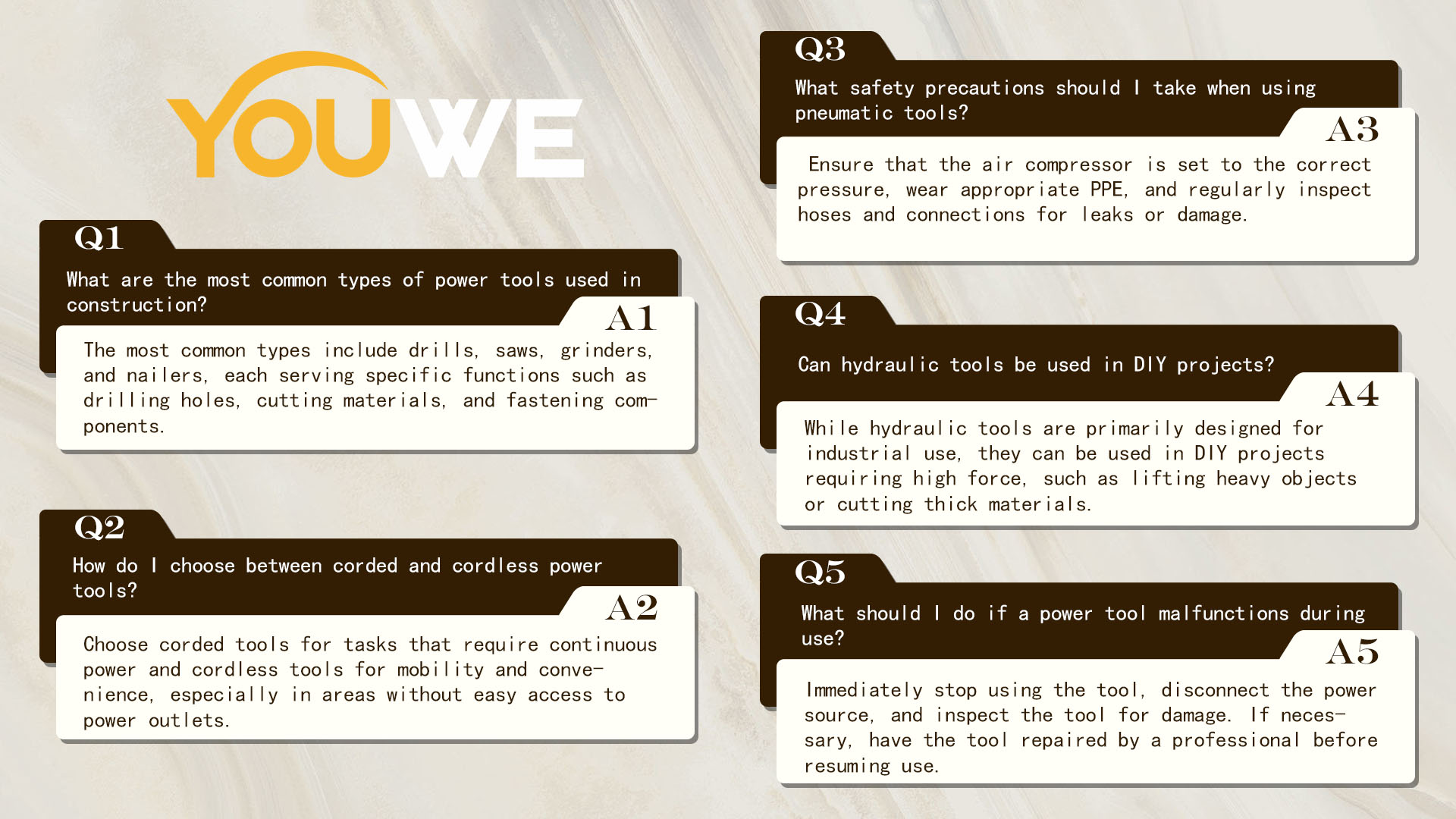Power tools are essential for various tasks across multiple industries, offering speed, precision, and efficiency. Whether you're a seasoned professional or a DIY enthusiast, understanding the types, uses, and safety measures associated with power tools is crucial. This comprehensive guide delves into everything you need to know about power tools, helping you make informed decisions and work safely.
Power tools have revolutionized how we approach tasks in construction, woodworking, metalworking, and more. They range from basic drills to advanced saws, each designed to perform specific tasks with enhanced efficiency. Understanding the different types of power tools and their uses ensures that you select the right tool for the job.
Power tools can be categorized based on their power source, function, and application. These classifications help in identifying the most suitable tool for your needs.
Electric power tools are the most commonly used type due to their versatility and reliability. They are powered by electricity and come in two primary forms:

Corded Tools: Connected directly to an electrical outlet, corded tools offer continuous power, making them ideal for heavy-duty tasks. They are typically more powerful than their cordless counterparts.
Cordless Tools: Powered by rechargeable batteries, cordless tools provide mobility and convenience, especially in areas without access to power outlets. However, they are limited by battery life and may require frequent recharging during extended use.
Pneumatic tools are powered by compressed air, typically supplied by an air compressor. They are known for their high power-to-weight ratio, making them ideal for tasks that require high torque and precision.Commonly used in automotive repair, construction, and manufacturing, pneumatic tools are favored for tasks such as tightening bolts, driving nails, and sanding.
Hydraulic tools use pressurized fluid to generate power. These tools are often used in specialized applications that require high force, such as cutting, crimping, and lifting heavy objects. Hydraulic tools are commonly found in industries such as construction, mining, and shipbuilding, where they are used for tasks like cutting steel cables, crimping large connectors, and lifting heavy machinery.
Different tasks require different tools. Understanding the specific types of power tools and their intended uses will help you select the right tool for your project.
Drills are versatile tools used for creating holes in various materials such as wood, metal, and concrete. They come in multiple forms, including:
- hammer Drills: Ideal for drilling into hard materials like concrete and masonry.
- Impact Drivers: Designed for driving screws and bolts with high torque.
- Rotary Drills: Commonly used for general drilling tasks in wood and metal.
Saws are essential for cutting materials to size. There are various types of saws, each suited for different materials and cutting requirements:
- Circular Saws: Perfect for making straight cuts in wood and metal.
- Jigsaws: Used for making curved and intricate cuts in wood, metal, and plastic.
- Reciprocating Saws: Ideal for demolition work, capable of cutting through wood, metal, and drywall.
Grinders are powerful tools used for cutting, grinding, and polishing materials. They are widely used in metalworking and construction:
- Angle grinders: Versatile tools used for cutting, grinding, and polishing.
- Bench Grinders: Stationary grinders used for sharpening tools and shaping metal.
- Die Grinders: Compact tools ideal for precision grinding and polishing.
wrenches and impact tools are used for tightening and loosening fasteners. They are indispensable in automotive repair, construction, and assembly:
- Impact Wrenches: Deliver high torque for loosening and tightening bolts and nuts.
- Torque Wrenches: Provide precise control over the amount of torque applied to fasteners.
- Ratchet Wrenches: Allow for quick and easy tightening of fasteners in confined spaces.
Safety is paramount when using power tools. Following proper safety guidelines helps prevent accidents and ensures that tasks are completed efficiently.
Always wear the necessary PPE, including safety goggles, gloves, ear protection, and dust masks. This equipment protects you from flying debris, loud noises, and harmful dust.
Before using any power tool, read the manufacturer's instructions carefully. Understanding the tool's features, limitations, and proper usage helps prevent accidents.
A clean and organized work area reduces the risk of accidents. Ensure that tools are stored properly when not in use and that the workspace is free of clutter.
Regularly inspect your power tools for signs of wear, damage, or malfunction. Damaged tools should be repaired or replaced before use to avoid potential hazards.
Using the correct tool for the task not only ensures efficiency but also reduces the risk of accidents. Avoid using makeshift tools or forcing a tool to perform a task it was not designed for.
Always maintain a firm grip on the tool and ensure that you have a stable stance while working. This helps prevent loss of control, which can lead to accidents.
Always disconnect the power source before changing accessories or performing maintenance on your tools. This prevents accidental startups, which can cause serious injuries.
Power tools are indispensable in both professional and DIY settings, offering the power, precision, and efficiency needed to complete tasks effectively. By understanding the different types of power tools, their specific uses, and essential safety measures, you can work more effectively and safely.

Contact: Candy
Phone: 18869941430
E-mail: Inquiry@cnyouwe.com
Whatsapp:+86-18869941430
Add: Building 6 Mingyang Park,1389 Jinyuan Road,Chisong Town,Jinhua city,zhejiang